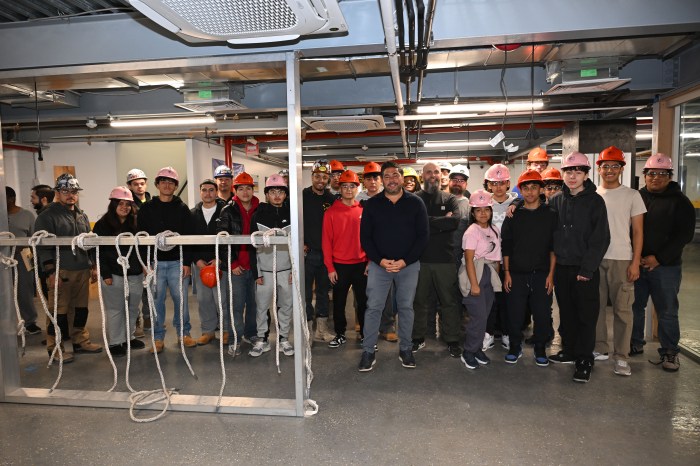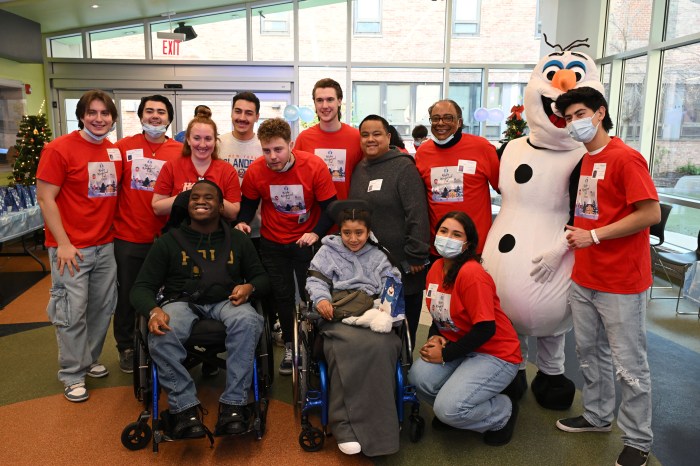Sixteen-year-old Alex Schirling struggles daily with the dilemma of what to do with his life. As a student at Cathedral Preparatory Seminary, an exploratory school for young men interested in the priesthood, he sees first hand the sacrifice it takes to become a priest. He cannot imagine a life not centered on service, and to him the priesthood is the ultimate service. Then there is singing.
“When I’m on the stage performing everything else falls away. There’s no struggle or dilemma; I’m just thinking about the song, about giving the best performance possible, even about how I can act out the lyrics. I love it. Nothing makes me happier than being up on stage,” Schirling said.
One of 24 students chosen by Great Neck Music Conservatory Director Pippa Borisy to perform at Carnegie Hall, this teen has already taken his musical career further than many professional musicians ever will. “Carnegie Hall is the best; I’m so aware of how lucky I am to have had this opportunity,” said the would-be priest.
Schirling, whose performance was held on Sunday, February 11, has had to overcome more than most vocal students to succeed. When he was nine years old, he was diagnosed with Tourette’s syndrome, a much-misunderstood neurological disorder, which manifests itself in involuntary movements and sounds, called tics. “I’ve never let my Tourette’s stop me from accomplishing anything,” he said.
Schirling never gets nervous during performances, even at Carnegie Hall when the first of two songs he performed, “La Ci Darem La Mano” from Don Giovanni came at the beginning of the show, and the second, “Non Piu Andrai” from the Marriage of Figaro, not until the end.
The 24 students were chosen for the performance from a student body of 400. Schirling was selected for this High Honors Concert after distinguishing himself as one of the students at the Conservatory that had achieved the most and progressed the furthest.
When asked how many hours a day his teachers told him to study, Fran Greenberg, the Conservatory’s manager said, “They don’t have to tell him anything. He’s so dedicated and motivated. He loves singing and is happy to put in the time.”
Schirling has been taking private lessons in voice at the Conservatory for almost a year, but had only practiced the two songs he performed for six weeks. “I couldn’t have done it without Maria Tegzes, my teacher at the Conservatory.” She’s one of the most important musical influences in his life.
His poise and professionalism come not just from innate talent, but also from hours of practice and is rooted in his spirituality. “I’ve been singing all my life,” he said. Schirling is a member of three different choirs. Every weekday he gets to the seminary at 7 a.m. for 45 minutes practice with the school band. Every Sunday after mass, he practices 1 to 1-1/2 hour with the parish choir and every Tuesday he goes to St. Matthias at 7:30 p.m. and sings until 9:30 p.m.
I’m one of three brothers,” he said. “We each have our talents.” His eldest brother, 19, and the most intellectual of the family, is at Boston College. His next brother, 18, goes to the New England culinary institute.
The one thread that runs through the whole family is singing. “I’m so impressed with Alex. He seemed so professional on stage. We have all been singing for a long time but he is the best, most confident, and professional. I hope he sticks with this even if it’s just a hobby - it a nice thing for him to do,” said Schirling’s mother, Rovena who is on the Board of Directors of the national Tourette Syndrome Association.
“I’m so proud of him. He’s able to be a good role model to children struggling with Tourette’s,” she said of her son, who in her opinion has a natural talent for helping others.
Speaking of his commitment to his choirs Schirling said, “I’ve done all this by my own free will. I enjoy going to each and every one of them.”



































